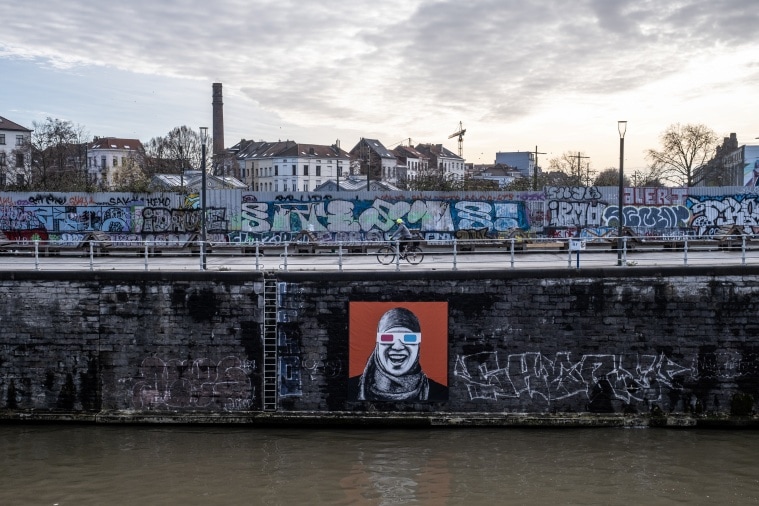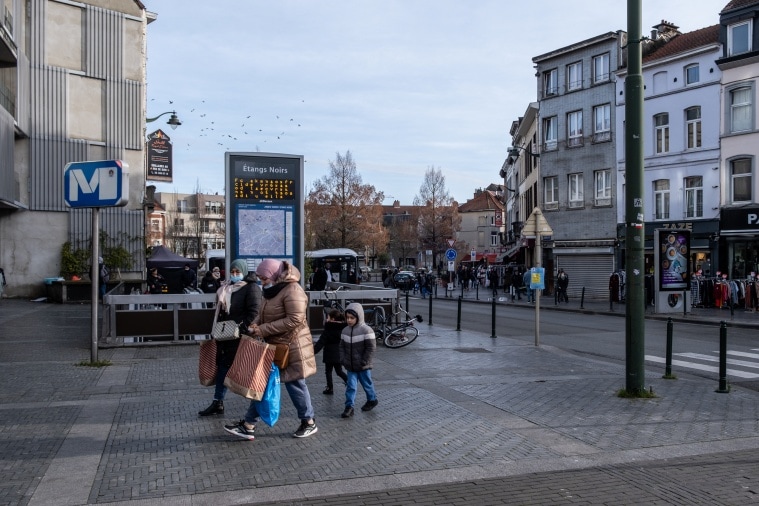 People walk through the town square of the Molenbeek neighborhood of Brussels on Dec. 7, 2021. (The New York Times)
People walk through the town square of the Molenbeek neighborhood of Brussels on Dec. 7, 2021. (The New York Times) Written by Elian Peltier
With children’s drawings and colorful posters now adorning the walls and windows, it was easy to forget the notorious past of the red brick building, whose history still haunts a working-class Brussels neighborhood.
On a recent morning, in a former bar converted into a community center, Assetou Elabo was arranging tables for students who would soon join her for homework tutoring.
A few years earlier, the bar’s owner had let drug trafficking proliferate on the site. With patrons, he would watch videos from the Islamic State. And in the basement of the bar, Les Béguines, he would chat online with a friend who had joined the terrorist group in Syria.
Then in November 2015, he detonated his explosive vest as part of a series of attacks in and around Paris.
For many, the bar epitomized all that had gone wrong in Molenbeek, the neighborhood of nearly 100,000 people that was home to seven of the 20 terrorists who killed 130 people in France that November and 32 more in Brussels four months later.
But if the bar symbolized what Molenbeek had been, the community center shows what the neighborhood is trying to become.
Since being opened by local residents in 2018, the center has been dedicated to helping children, students looking for jobs and people with disabilities. Although the neighborhood remains predominantly Muslim, it is more diverse than usually portrayed, with newcomers changing its composition in recent years.
 A portrait along a canal in the Molenbeek neighborhood of Brussels on Dec. 7, 2021. (The New York Times)
A portrait along a canal in the Molenbeek neighborhood of Brussels on Dec. 7, 2021. (The New York Times) “What we do here is the opposite of what the Abdeslam brothers did,” Elabo, a social worker, said of the bar’s owner, Brahim, and his brother Salah, who helped manage it.
After the Paris attacks, Molenbeek was subjected to intense global scrutiny. Television crews from around the world broadcast for days from the neighborhood’s central square or near the bar, making residents feel like they were living on a movie set.
Some journalists would stop passersby and ask to be introduced to a jihadi. Opinion shapers and policymakers exhorted moderate Muslims to do more to combat extremism.
Six years later, many in Molenbeek have taken up the challenge. And far from the public attention, they have tried to rebuild their community, although it still faces the same endemic problems — from poverty to unemployment to crime — that contributed to the radicalization of some residents.
“We were ashamed after the attacks, but now I proudly say that I’m from Molenbeek,” said Dr. Sara Debulpaep, 47, a pediatrician who has lived here for nearly three decades.
Since the attacks, the government has awarded numerous grants meant to improve life here and expand opportunities for the neighborhood’s young people.
Bachir Mrabet, a youth worker at Foyer, one of the main community centers in Molenbeek, said he had begun news literacy workshops after the attacks, as well as theater workshops to let off tensions. He also now organizes youth meetings twice a month instead of once every two months before the bombings. “We’re much more vigilant,” he said.
 People walk in the Molenbeek neighborhood of Brussels on Dec. 7, 2021. (The New York Times)
People walk in the Molenbeek neighborhood of Brussels on Dec. 7, 2021. (The New York Times) But resources are still tight, and residents still feel stigmatized, said Ali El Abbouti, another youth worker at Foyer who manages his own community center.
“We’ve been asked to do even more, to solve all the problems, but with so little resources,” El Abbouti said. “And we were already doing so much.” He wants to create places where young people are encouraged to express themselves; recent projects have included a podcast in Arabic about the origins of Molenbeek’s first generations of Moroccan immigrants.
Volunteers say young people need more guiding examples from older and successful local residents. “They want mentors, they don’t have that around them,” said Meryam Fellah, a 27-year-old chemistry student who provides coaching at the community center that once housed the bar.
Molenbeek’s major changes are not coming only from longtime residents, but also from some of the same outside forces that are reshaping much of Brussels.
While residents of Moroccan origins remain a majority in Molenbeek, in recent years more Eastern Europeans, sub-Saharan Africans and Roma people have arrived.
The neighbors of Debulpaep, the pediatrician, include Albanians, Congolese, Guineans, Italians, Poles and Palestinians. Residents say Molenbeek’s diversity is what makes it unique.
Affluent new residents from the Dutch-speaking Flanders region of Belgium have moved into expensive housing along a gentrifying strip of artists’ studios and organic shops.
In Molenbeek, one can now visit an exhibition on Belgian adult movie theaters in one of Brussels’ trendiest museums. Art projects, underground concerts and cafes are gaining ground.
But integrating those patrons and the customers of the kebab restaurants and traditional Islamic wedding shops that dot the neighborhood’s main street remains a challenge, residents say.
“There’s very little mixing,” El Abbouti said on a recent afternoon as he walked past a gated residential complex.
And Molenbeek remains one of the poorest and most densely populated areas in Belgium. At 21%, the unemployment rate is three times the country’s average.
While the terrorist threat has been downgraded, cannabis trafficking has exploded, and so have violent clashes among gangs, said Ysebaert, the local police chief. “Our problems are very similar to those of large European cities.”
- The Indian Express website has been rated GREEN for its credibility and trustworthiness by Newsguard, a global service that rates news sources for their journalistic standards.

